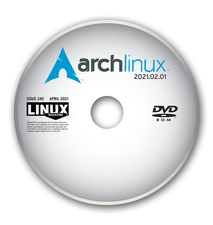On the DVD
On the DVD

Arch Linux 2021.02.01 and MX Linux mx-19.3
Arch Linux (64-bit)
Begun in 2002, Arch Linux is one of the most respected distributions available. Although less well-known than Ubuntu or Fedora, Arch has a reputation for the adherence to its core values of remaining simple and lightweight. However, what Arch means by those terms may not be what others assume.
By simple, Arch means that its packages are as close to those of upstream developers as possible. The only modifications are those accepted by the upstream developers. When Arch does patch a package, the patch is usually a bug fix, which is removed when a newer upstream version of the package is available. Similarly, by lightweight, Arch means that it installs a bare-bones system, without the usual curated selection of packages that developers assume that users might want.
In keeping with both these values, Arch does not install in 10 minutes using average defaults. An Arch installation is highly individualistic, with users expected to choose their system configurations for themselves. For this reason, even if you have some experience installing Linux, you should install Arch Linux with its installation guide open by your side (https://wiki.archlinux.org/index.php/Installation_guide).
[...]
Buy this article as PDF
(incl. VAT)
Buy Linux Magazine
Subscribe to our Linux Newsletters
Find Linux and Open Source Jobs
Subscribe to our ADMIN Newsletters
Support Our Work
Linux Magazine content is made possible with support from readers like you. Please consider contributing when you’ve found an article to be beneficial.

News
-
Chaos Comes to KDE in KaOS
KaOS devs are making a major change to the distribution, and it all comes down to one system.
-
New Linux Botnet Discovered
The SSHStalker botnet uses IRC C2 to control systems via legacy Linux kernel exploits.
-
The Next Linux Kernel Turns 7.0
Linus Torvalds has announced that after Linux kernel 6.19, we'll finally reach the 7.0 iteration stage.
-
Linux From Scratch Drops SysVinit Support
LFS will no longer support SysVinit.
-
LibreOffice 26.2 Now Available
With new features, improvements, and bug fixes, LibreOffice 26.2 delivers a modern, polished office suite without compromise.
-
Linux Kernel Project Releases Project Continuity Document
What happens to Linux when there's no Linus? It's a question many of us have asked over the years, and it seems it's also on the minds of the Linux kernel project.
-
Mecha Systems Introduces Linux Handheld
Mecha Systems has revealed its Mecha Comet, a new handheld computer powered by – you guessed it – Linux.
-
MX Linux 25.1 Features Dual Init System ISO
The latest release of MX Linux caters to lovers of two different init systems and even offers instructions on how to transition.
-
Photoshop on Linux?
A developer has patched Wine so that it'll run specific versions of Photoshop that depend on Adobe Creative Cloud.
-
Linux Mint 22.3 Now Available with New Tools
Linux Mint 22.3 has been released with a pair of new tools for system admins and some pretty cool new features.
